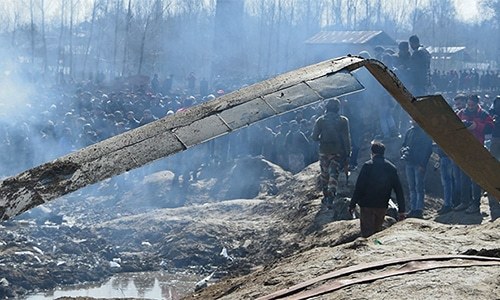PM chides India over false claim of F-16 downing

ISLAMABAD: Prime Minister Imran Khan on Saturday rebuked Indian leadership over its false claim of shooting down a Pakistani F-16 fighter jet in a dogfight amid growing tension between the two countries in February.
“The truth always prevails and is always the best policy,” the prime minister tweeted. “BJP’s attempt to win the elections through whipping up war hysteria and false claim of downing a Pak F-16 has backfired with US defence officials also confirming that no F-16 was missing from Pakistan’s fleet.”
“India’s claim that one of its fighter pilots shot down a Pakistani F-16 fighter jet in an aerial battle between the two nuclear powers in February appears to be wrong,” reads a report recently posted on the website of US-based Foreign Policy magazine.
The report cites two senior US defence officials with direct knowledge of the situation revealing that US personnel had recently counted Pakistan’s F-16s and found none missing.
Says it was BJP’s attempt to win elections by whipping up war hysteria
The finding directly contradicts the account of Indian Air Force officials who said that Wing Commander Abhinandan Varthaman had managed to shoot down a Pakistani F-16 before his own plane was downed by a Pakistani missile.
“It is possible that in the heat of combat, Varthaman, flying a vintage MiG-21 Bison, got a lock on the Pakistani F-16, fired, and genuinely believed he scored a hit. But the count, conducted by US authorities on the ground in Pakistan, sheds doubt on New Delhi’s version of events, suggesting that Indian authorities may have misled the international community about what happened that day,” the Foreign Policy report says.
The report comes just days before the beginning of India’s general elections, in which Prime Minister Narendra Modi is seeking another term in office.
In the weeks leading up to the election, tensions between India and Pakistan escalated to levels not seen in decades after more than 40 Indian security officials were killed in an attack in India-held Kashmir on Feb 14. Both sides have been accused of spreading disinformation and fanning nationalistic flames.
Although the report is not likely to sway Indian voters, Vipin Narang, an associate professor of political science at MIT, said the way the events had unfolded might affect India’s efforts to deter Pakistan in the future.
“As details come out, it looks worse and worse for the Indians,” Mr Narang said. “It looks increasingly like India failed to impose significant costs on Pakistan, but lost a plane and a helicopter of its own in the process.”
The dogfight between fighter jets of the two countries occurred on Feb 27 when, according to India, a group of Pakistani jets entered its airspace in response to the first Indian air raid on Pakistani territory since the 1971 war a day earlier. India scrambled its own jets and gave chase. During the aerial battle that ensued, Varthaman’s jet took a missile hit but he ejected safely into Pakistani territory. He was captured by the Pakistani army and released days later in an effort to deescalate the crisis.
According to the report, one of the senior US defence officials with direct knowledge of the count said that Pakistan had invited the United States to physically count its F-16 planes after the incident as part of an end-user agreement signed when the foreign military sale was finalised.
“Generally in such agreements, the United States requires the receiving country to allow US officials to inspect the equipment regularly to ensure it is accounted for and protected. Some of Pakistan’s F-16s were acquired from Jordan through a third party transfer, but even these are subject to the end-user agreement,” Richard Aboulafia, an analyst with the Teal Group, an aerospace and defence firm, was quoted as saying.
“If you are a user of American defence products … you need to go through a very clear process to send those weapons to a third party,” explained Mr Aboulafia, noting that the US had a rigid process in place to try to ensure its equipment did not fall into the hands of “hostile actors”.
Published in Dawn, April 7th, 2019















































